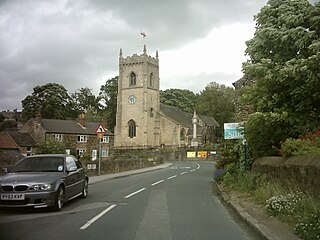This page is based on this
Wikipedia article Text is available under the
CC BY-SA 4.0 license; additional terms may apply.
Images, videos and audio are available under their respective licenses.
Clinton is an English surname, indicating one's ancestors came from English places called Glympton or Glinton. Clinton has frequently been used as a given name since the late 19th century. Baron Clinton is a title of peerage in England, originally created in 1298.
Brennan is an Irish surname which is an Anglicised form of two different Irish language surnames—Ó Braonáin and Ó Branáin. Historically, one source of the surname was the prominent clan Ua Braonáin (O'Brennan) of Uí Duach (Idough) in Osraige who were a junior Dál Birn sept stemming from a younger son of Cerball mac Dúnlainge (d.888). Recent surname evaluations highlighted the geographic consistency of this lineage in the barony of Idough.
Hick is a surname or a nickname. Notable people with the name include:
Davies is a patronymic Welsh surname. It may be a corruption of Dyfed, itself a corruption of Dési, colonists from south-east Ireland who occupied the old tribal area of the Demetae in south-west Wales in the late third century AD, establishing a dynasty which lasted five centuries. Dyfed is recorded as a surname as late as the 12th century for e.g. Gwynfard Dyfed, born in 1175. 'Dafydd' appears as a given name in the 13th Century, e.g. Dafydd ap Gruffydd (1238–1283), Prince of Wales, and Dafydd ab Edmwnd, Welsh poet. The given name 'Dafydd' is generally translated into English as 'David'. Alternatively it may derive from David, the name of Wales's patron saint. In Wales Davies is standardly pronounced DAY-vis, that is, identically to Davis. This pronunciation is also used by many outside the United Kingdom, where it competes with the spelling pronunciation DAY-veez, which is particularly common in the US.
Turnbull is a northern English and Scottish surname. For theories of its etymology, see Clan Turnbull.
Tait is a Scottish surname which means "pleasure" or "delight." The origins of the name can be traced back as far as 1100.
Brett derives from a Middle English surname meaning "Briton" or "Breton", referring to the Celtic people of Britain and Brittany, France. Brette can be a feminine name.
Bell is a surname common in English speaking countries with several word-origins.
Edwards is a patronymic surname, which arose separately in England and Wales. It means "son of Edward". Edwards is the 14th most common surname in Wales and 21st most common in England. Within the United States, it was ranked as the 49th-most common surname as surveyed in 1990, falling to 51st in 2014.
Frawley is a surname. Notable people with the surname include:

Ken Thornett, also known by the nickname of "The Mayor of Parramatta", was an Australian rugby league fullback. He represented the Kangaroos in twelve Tests during 1963 and 1964 and on the off-season Kangaroo Tour.
Tennant is a Scottish surname, and may refer to:
Thompson is a patronymic surname of English and Scottish origin, with a variety of spellings, meaning "son of Thom". An alternative origin may be geographical, arising from the placename Thompson. Thom(p)son is the English translation of MacTavish, which is the Anglicised version of the Gaelic name of MacTamhais. During the Plantation period, settlers carried the name to Ireland. It is the 14th most common surname in the United Kingdom and 23rd most common in the United States. According to the 2010 United States Census, Thompson was the 23rd most frequently reported surname, accounting for 0.23% of the population.
Maxwell is a Scottish surname and is a habitational name derived from a location near Melrose, in Roxburghshire, Scotland. This name was first recorded in 1144, as Mackeswell, meaning "Mack's spring ". The surname Maxwell is also common in Ulster; where it has, in some cases, been adopted as alternate form of the surname Miskell. The surname Maxwell is also used as a Jewish surname, either as an adoption of the Scottish name, or as an Americanization of one of several like-sounding Jewish surnames. The surname Maxwell is represented in Scottish Gaelic as MacSual.
Cleary is an Irish surname; which derives from Gaelic Ó Cléirigh/Mac Cleirigh, meaning 'descendent or son of cleric. it may relate to:
Coen can be a masculine given name, a surname or a place name.
Gillett is a surname. Notable people with the surname include:
Houston is a surname of Scottish origin. In the mountains of Scotland's west coast and on the Hebrides islands, the ancestors of the Houston family were born. Clan Houston comes from the medieval Scottish given name Hugh. Houston is a patronymic surname, which belongs to the category of hereditary surnames. In general, patronyms were derived from either the first name of the father of the bearer, or from the names of famous religious and secular figures. By and large, surnames descending from one's father's name were the most common. The surname also came from the place called Houston, Renfrewshire
in the west central Lowlands of Scotland. In Old English, the name Houston, meant the settlement belonging to Hugh.

